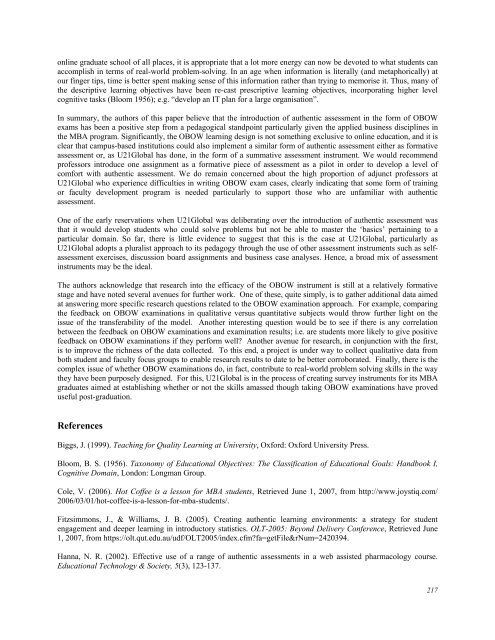July 2007 Volume 10 Number 3 - Educational Technology & Society
July 2007 Volume 10 Number 3 - Educational Technology & Society
July 2007 Volume 10 Number 3 - Educational Technology & Society
You also want an ePaper? Increase the reach of your titles
YUMPU automatically turns print PDFs into web optimized ePapers that Google loves.
online graduate school of all places, it is appropriate that a lot more energy can now be devoted to what students can<br />
accomplish in terms of real-world problem-solving. In an age when information is literally (and metaphorically) at<br />
our finger tips, time is better spent making sense of this information rather than trying to memorise it. Thus, many of<br />
the descriptive learning objectives have been re-cast prescriptive learning objectives, incorporating higher level<br />
cognitive tasks (Bloom 1956); e.g. “develop an IT plan for a large organisation”.<br />
In summary, the authors of this paper believe that the introduction of authentic assessment in the form of OBOW<br />
exams has been a positive step from a pedagogical standpoint particularly given the applied business disciplines in<br />
the MBA program. Significantly, the OBOW learning design is not something exclusive to online education, and it is<br />
clear that campus-based institutions could also implement a similar form of authentic assessment either as formative<br />
assessment or, as U21Global has done, in the form of a summative assessment instrument. We would recommend<br />
professors introduce one assignment as a formative piece of assessment as a pilot in order to develop a level of<br />
comfort with authentic assessment. We do remain concerned about the high proportion of adjunct professors at<br />
U21Global who experience difficulties in writing OBOW exam cases, clearly indicating that some form of training<br />
or faculty development program is needed particularly to support those who are unfamiliar with authentic<br />
assessment.<br />
One of the early reservations when U21Global was deliberating over the introduction of authentic assessment was<br />
that it would develop students who could solve problems but not be able to master the ‘basics’ pertaining to a<br />
particular domain. So far, there is little evidence to suggest that this is the case at U21Global, particularly as<br />
U21Global adopts a pluralist approach to its pedagogy through the use of other assessment instruments such as selfassessment<br />
exercises, discussion board assignments and business case analyses. Hence, a broad mix of assessment<br />
instruments may be the ideal.<br />
The authors acknowledge that research into the efficacy of the OBOW instrument is still at a relatively formative<br />
stage and have noted several avenues for further work. One of these, quite simply, is to gather additional data aimed<br />
at answering more specific research questions related to the OBOW examination approach. For example, comparing<br />
the feedback on OBOW examinations in qualitative versus quantitative subjects would throw further light on the<br />
issue of the transferability of the model. Another interesting question would be to see if there is any correlation<br />
between the feedback on OBOW examinations and examination results; i.e. are students more likely to give positive<br />
feedback on OBOW examinations if they perform well? Another avenue for research, in conjunction with the first,<br />
is to improve the richness of the data collected. To this end, a project is under way to collect qualitative data from<br />
both student and faculty focus groups to enable research results to date to be better corroborated. Finally, there is the<br />
complex issue of whether OBOW examinations do, in fact, contribute to real-world problem solving skills in the way<br />
they have been purposely designed. For this, U21Global is in the process of creating survey instruments for its MBA<br />
graduates aimed at establishing whether or not the skills amassed though taking OBOW examinations have proved<br />
useful post-graduation.<br />
References<br />
Biggs, J. (1999). Teaching for Quality Learning at University, Oxford: Oxford University Press.<br />
Bloom, B. S. (1956). Taxonomy of <strong>Educational</strong> Objectives: The Classification of <strong>Educational</strong> Goals: Handbook I,<br />
Cognitive Domain, London: Longman Group.<br />
Cole, V. (2006). Hot Coffee is a lesson for MBA students, Retrieved June 1, <strong>2007</strong>, from http://www.joystiq.com/<br />
2006/03/01/hot-coffee-is-a-lesson-for-mba-students/.<br />
Fitzsimmons, J., & Williams, J. B. (2005). Creating authentic learning environments: a strategy for student<br />
engagement and deeper learning in introductory statistics. OLT-2005: Beyond Delivery Conference, Retrieved June<br />
1, <strong>2007</strong>, from https://olt.qut.edu.au/udf/OLT2005/index.cfm?fa=getFile&rNum=2420394.<br />
Hanna, N. R. (2002). Effective use of a range of authentic assessments in a web assisted pharmacology course.<br />
<strong>Educational</strong> <strong>Technology</strong> & <strong>Society</strong>, 5(3), 123-137.<br />
217

















